热身 Warm-up
1 给下面的词语选择对应的图片 Match the pictures with the words.

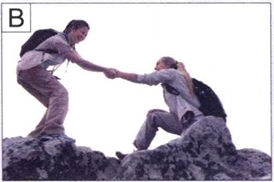
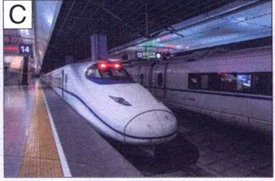
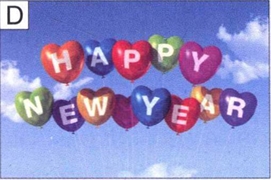
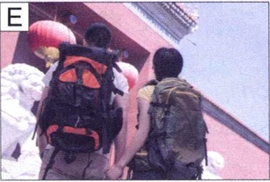
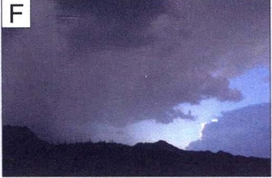
-
xīnnián
① 新年
-
piào
② 票
-
lǚyóu
③ 旅游
-
bāngzhù
④ 帮助
-
yīn
⑤ 阴
-
huǒchēzhàn
⑥ 火车站
2 看下面的图片,用汉语说出它们的名字 Look at the pictures and say the names of the things in Chinese.

① ______

② ______

③ ______
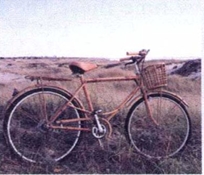
④ ______
课文 Text
1 在朋友家 At a friend’s home 15-1
Jīntiān shì shí’èr yuè èrshí rì, xīnnián jiù yào dào le.
A: 今天 是 12 月 20 日,新年 就要 到 了。
Xīnnián nǐ zhǔnbèi zuò shénme?
B: 新年 你 准备 做 什么?
Wǒ xiǎng qù Běijīng lǚyóu, Běijīng hěn bùcuò, wǒ qùguò yí cì.
A: 我 想 去 北京 旅游,北京 很 不错,我 去过 一 次。
Nǐ mǎi piào le ma?
B: 你 买 票 了 吗?
Hái méiyǒu ne, míngtiān jiù qù huǒchēzhàn mǎi piào.
A: 还 没有 呢,明天 就 去 火车站 买 票。
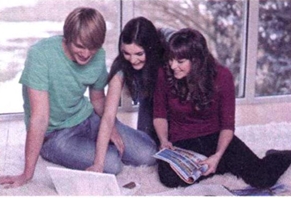
English Version
A: Today is December 20th. The New Year is coming.
B: What plans do you have?
A: I want to take a trip to Beijing. Beijing is a nice place. I’ve been there once.
B: Have you bought the ticket?
A: Not yet. I’ll go to the railway station to buy it tomorrow.
New Words
| 1. 日 | rì | n. day, date |
|---|---|---|
| 2. 新年 | xīnnián | n. New Year |
| 3. 票 | piào | n. ticket |
| 4. 火车站 | huǒchēzhàn | n. railway station |
2 在公司 In the company 15-2
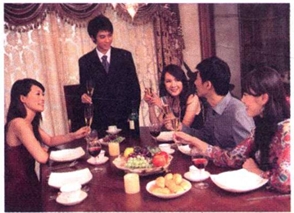
Shíjiān guò de zhēn kuài, xīn de yì nián kuàiyào dào le!
A: 时间 过 得 真 快,新的 一 年 快要 到 了!
Shì a, xièxie dàjiā zhè yì nián duì wǒ de bāngzhù!
B: 是 啊,谢谢 大家 这 一 年 对 我 的 帮助!
Xīwàng wǒmen de gōngsī míngnián gèng hǎo!
C: 希望 我们 的 公司 明年 更 好!
English Version
A: How time flies! The New Year is approaching!
B: Yes. Thank you all for your help during the past year.
C: I hope our company will become even better in the next year.
New Words
| 5. 大家 | dàjiā | pron. all, everybody |
|---|---|---|
| *6. 更 | gèng | adv. more, to a greater extent |
3 在车站 At the station 15 – 3
Nǐ mèimei zěnme hái méi lái?
A: 你妹妹怎么还没来?
Dōu bā diǎn sìshí le!
都八点四十了!
Wǒmen zài děng tā jǐ fēnzhōng ba.
B: 我们再等她几分钟吧。
Dōu děng tā bàn gè xiǎoshí le!
A: 都等她半个小时了!
Tā lái le, wǒ tīngjiàn tā shuō huà le.
B: 她来了, 我听见她说话了。
A: Why hasn’t your younger sister arrived yet? It’s already eight forty.
B: Let’s wait for a few more minutes.
A: We’ve already waited for half an hour.
B: She is here. I heard her voice.
7. 妹妹 mèimei n. younger sister
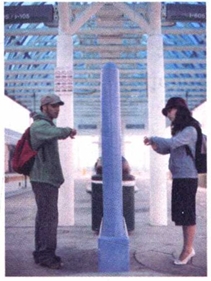
4 在咖啡馆门口 Outside a coffee house 15 – 4
Tiān yīn le, wǒ yào huíqù le.
A: 天阴了, 我要回去了。
Hǎo de. Kuàiyào xià yǔ le, nǐ lùshang màn diǎnr.
B: 好的。快要下雨了, 你路上慢点儿。
Méi guānxi, wǒ zuò gōnggòng qìchē.
A: 没关系, 我坐公共汽车。
Hǎo de. Zàijiàn.
B: 好的。再见。
A: It’s overcast. I have to go home.
B: OK. It’s going to rain. Be careful on your way.
A: Don’t worry. I’ll take a bus.
B: Good. Bye.
8. 阴 yīn adj. overcast, cloudy
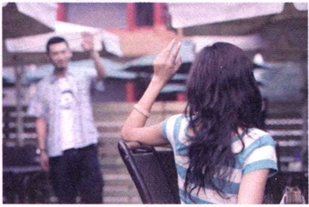
注释 Notes
1 动作的状态 “要……了” “要……了” Indicating the State of an Action
用 “快要/快/就要/要……了” 表示某事将要发生。例如:
The structure “快要/快/就要/要……了” indicates that something is going to happen. For example:
| Subject | Predicate | ||
|---|---|---|---|
| 快要/快/就要/要 | V ( + O ) | 了 | |
| 火车 | 快要 | 来 | 了。 |
| 要 | 下雨 | 了。 | |
| 新的一年 | 快要 | 到 | 了。 |
如果句子中有时间状语,只能用 “就要……了”。例如:
If there is an adverbial of time in the sentence, then only “就要……了” can be used. For example:
| 时间状语 Adverbial of Time |
Subject | Predicate | ||
|---|---|---|---|---|
| 就要 | V ( + O ) | 了 | ||
| 下个月 | 我们 | 就要 | 回国 | 了。 |
| 明天 | 姐姐 | 就要 | 走 | 了。 |
| 下个星期 | 我们 | 就要 | 考试 | 了。 |
2 “都……了” The Structure “都……了”
“都……了” 可以表示 “已经” 的意思,通常含有强调或不满的语气。
The structure “都……了” means “already”, usually conveying an emphatic or a complaining tone. For example:
- 都8点了,快点儿起床吧。
- 你都十岁了,可以自己洗衣服了。
- 都等她半个小时了。

Comments